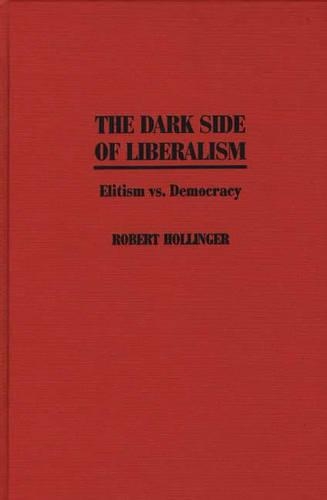
The Dark Side of Liberalism: Elitism vs. Democracy
(Hardback)
Publishing Details
The Dark Side of Liberalism: Elitism vs. Democracy
By (Author) Robert Hollinger
Bloomsbury Publishing PLC
Praeger Publishers Inc
23rd August 1996
United States
Classifications
Tertiary Education
Non Fiction
Political structures / systems: democracy
Political science and theory
320.51
Physical Properties
Hardback
176
Width 156mm, Height 235mm
454g
Description
This interdisciplinary study on liberalism explores the history of liberal thought in philosophy, the social sciences, cultural theory, and American political theory. The discussion focuses on an internal conflict between cultural and political values that favor political elitism and doctrines that favor some form of political democracy. Telling the story of the liberal elite and its ambivalent relationship to democracy, Hollingers show why the decline of liberalism does not pave the way for democratic participation. Addressing the current political and cultural climate, Hollinger outlines a postmodern view of democracy.
Reviews
[H]ollinger's is a timely contribution to a debate whose resurgence can only be welcomed and encouraged.-Review of Radical Political Economics
Hollinger attempts to rescue the theory of participatory democracy by critiquing the elitist elements of the liberal tradition and reconstructing its radical elements....his interdisciplnary analyses, historical observations, and intellectual insights, and the breadth of literature he cites, makes this a thought-provoking work. Recommended for graduate students and faculty in political science, sociology, philosophy, and education.-Choice
"Hollinger's is a timely contribution to a debate whose resurgence can only be welcomed and encouraged."-Review of Radical Political Economics
"[H]ollinger's is a timely contribution to a debate whose resurgence can only be welcomed and encouraged."-Review of Radical Political Economics
"Hollinger attempts to rescue the theory of participatory democracy by critiquing the elitist elements of the liberal tradition and reconstructing its radical elements....his interdisciplnary analyses, historical observations, and intellectual insights, and the breadth of literature he cites, makes this a thought-provoking work. Recommended for graduate students and faculty in political science, sociology, philosophy, and education."-Choice
Author Bio
ROBERT HOLLINGER is Associate Professor of Philosophy at Iowa State University./e He is author of Postmodernism and the Social Sciences: A Thematic Approach and coeditor, with David Depew, of Pragmatism: From Progressivism to Postmodernism (Praeger, 1994).
